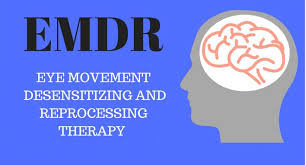EMDR is the abbreviation for Eye Movement Desensitisation and Reprocessing
Trauma results from experiencing events which lead to loss of life or threat to life, real or perceived, either to the self or as a witness, obvious examples being war, rape, violence etc, the list is virtually endless. Less obvious but no less damaging are the long term cumulative traumas of illness, poverty, domestic abuse and, especially for children, being neglected or abused by their carers.
Normally, the individual processes traumatic experiences naturally and heals with time and care from others. However, when a person is severely traumatised, either by an overwhelming event or by being repeatedly subjected to distress, this healing process may become overloaded. The effects of the trauma are then stored in the nervous system in their “raw” form and can re-emerge in full force from a small trigger such as a sound or smell, colour or sensation or memory.
This reaction, if not treated, can develop into Post Traumatic Stress Disorder (PTSD) and can persist for months or many years. Trauma can also accumulate with little outward sign over many years and develop into full blown PTSD after a seemingly mild event.
EMDR frees up the body and mind’s combined natural healing ability and therefore can shorten treatment times dramatically. However, the length of treatment will vary according to the severity and duration of traumatic experience. A single event in an otherwise “normal’ life may only take a few sessions but the effects of long term complex trauma can take much longer.
Problems that EMDR can help:
Post traumatic stress and Post Traumatic Stress Disorder
Depression
Anxiety based disorders, including panic attacks,phobias, Obsessive Compulsive Disorder
Effects of abuse; verbal, physical and sexual
Self-esteem issues
Attacks of anger and rage
Addictions to alcohol, drugs, gambling, sex, pornography etc
Confidence issues, performance anxiety, improving performance in sports, professional and artistic activities
Eating disorders


